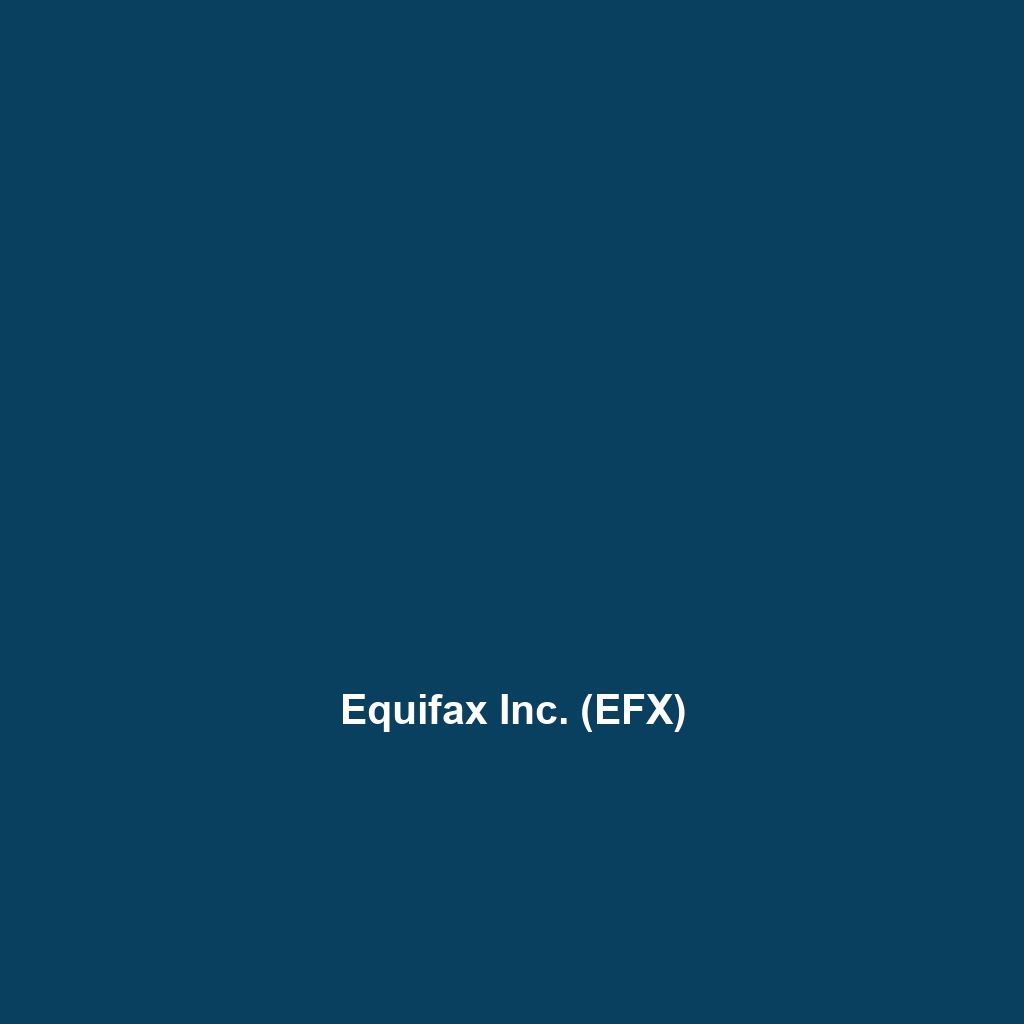Your cart is currently empty!
Tag: identity verification

Equifax Inc. (EFX)
Summary
Equifax Inc. (EFX) is a leading global data and analytics company headquartered in Atlanta, Georgia. Established in 1899, the firm provides solutions focused on credit reporting, identity verification, fraud detection, and risk management. With a robust portfolio of data assets that provide innovative insights, Equifax aims to transform how businesses interact with consumers by empowering them with actionable data-driven intelligence. As of October 2023, Equifax continues to enhance its technological advancements to adapt to the evolving financial landscape, ensuring credibility and trustworthiness.
News
Recent news surrounding Equifax includes the company€„¢s announcement of its latest cybersecurity initiatives aimed at protecting consumer data. The growing concern around data breaches has prompted Equifax to increase its investment in advanced analytical tools and infrastructure. Additionally, Equifax has reported a 25% year-on-year increase in demand for its reporting services after the recent economic disruptions heightened consumer borrowing and lending activity across the US. Industry analysts have highlighted these developments as a positive sign of the company’s potential for growth amidst challenges.
Research
Research on Equifax reveals a strong position in the business intelligence sector specializing in consumer and business data services. Analysts suggest the company€„¢s ongoing investments in artificial intelligence and machine learning are likely to enhance their predictive capabilities in risk assessment and identity verification. Equifax€„¢s performance metrics indicate resilience, with a projected compound annual growth rate (CAGR) in revenues expected to outperform the general market trends over the next five years, providing a potentially lucrative opportunity for investors.
Charts
Equifax’s stock performance has shown volatility in line with broader market trends. Recent charts show a significant rebound after a dip attributed to cybersecurity concerns. Chart analysis indicates a bullish trend, with relative strength index (RSI) metrics suggesting overbought conditions but also indicating continued investor interest. Tracking key moving averages reveals that EFX is nearing a crossover of the 50-day and 200-day moving averages, commonly viewed as a bullish signal by traders.
Community
The Equifax community has been active in reinforcing consumer awareness regarding credit scores and identity protection. The company has implemented various outreach programs aimed at educating consumers about managing their financial health. Furthermore, Equifax actively engages with stakeholders through social media platforms and digital forums, fostering discussions around best practices in data security and credit management.
Statistics
- Market Cap: $23 billion,
- P/E Ratio: 18.15,
- Dividend Yield: 1.30%,
- 52-Week Range: $150.00 – $220.00,
- Average Volume: 1.1 million shares
Financials
- Revenue: $4.5 billion,
- Net Income: $1.1 billion,
- Cash Flow: $900 million
Historical Data
Historically, Equifax’s stock has experienced fluctuations influenced by both the economic environment and technology sector trends. Over the past five years, the company has seen consistent growth in revenue, with periodic adjustments linked to market conditions. Equity analysts often reference past performance in relation to their ongoing evaluations and forecasts, noting particularly how the company has navigated through economic downturns while generally maintaining profitability.
Profile
As one of the three largest credit reporting agencies in the U.S., Equifax plays a crucial role in the financial ecosystem. The company provides valuable insights to lenders, helping them assess the creditworthiness of individuals and businesses. Their comprehensive suite of services extends beyond traditional credit reports, offering fraud detection solutions and identity management services that cater to a diverse clientele including banks, financial organizations, and businesses across various sectors.
Analysis
Experts analyzing Equifax’s market position emphasize its strategic focus on innovation and consumer trust as keys to sustaining competitive advantage. The shift towards digital services has been deemed essential in retaining existing clients while attracting new ones. The company€„¢s proactive steps in fortifying data security infrastructure are also crucial in restoring reputation and instilling confidence among stakeholders following past incidents. Financial forecasts estimate that as Equifax enhances its technological framework, it will likely experience improved margins and greater overall financial stability.
Options
Equifax offers various options for investors. With its recent performance trends, many analysts suggest that covered call strategies may prove beneficial, particularly in the current market climate. These strategies allow investors to earn additional income while providing some downside protection. Additionally, Equifax’s dividend yield presents a steady income opportunity for those looking to balance growth and income within their portfolios.
Holders
Equifax boasts a diverse base of institutional and retail investors. Large institutional investors such as Vanguard Group, BlackRock, and Fidelity hold significant portions of EFX shares, indicating strong institutional confidence in the company€„¢s long-term stability and growth prospects. This institutional backing provides additional liquidity and market validation for the stock.
Sustainability
Equifax is committed to sustainable business practices, focusing on reducing its carbon footprint and promoting responsible data stewardship. The company has implemented several initiatives aimed at enhancing workplace diversity and community engagement while also ensuring the ethical use of data. Equifax€„¢s sustainability reporting outlines a commitment to transparency and accountability in its operations, which resonates with today’s socially conscious investors.
Key Executives
Top Institutional Holders
- Vanguard Group,
- BlackRock,
- Fidelity
For more financial insights and news, visit UpCubeMoney.com.

Dock (DOCK)
Dive into Dock (DOCK): A Comprehensive Overview
Name and Ticker Symbol: Dock is identified by its ticker symbol DOCK. As a prominent player in the thriving world of cryptocurrency, Dock aims to make a significant mark in blockchain technology and innovative tokenomics.
Founders, Launch Date, and History
Dock was founded by a dedicated team of blockchain enthusiasts and technology experts aiming to create a solution for data interoperability. The project officially launched in 2019, gathering momentum through strategic partnerships and community engagement. Key milestones include collaborations with various organizations to promote the adoption of its technology and a focus on enhancing DeFi capabilities through innovative use cases.
Blockchain Platform
Dock operates on the Ethereum blockchain, which is recognized for its robust smart contract capabilities. As a layer 1 solution, Dock benefits from Ethereum€„¢s security and scalability features while contributing to the wider DeFi ecosystem.
Purpose and Use Case
The primary purpose of Dock is to facilitate the creation and sharing of verifiable credentials on the blockchain. Use cases include identity verification, credential management, and enhancing trust in digital interactions€Âmaking it ideal for sectors like education, healthcare, and finance. Its ability to provide verifiable identity solutions positions Dock as a transformative force in the digital identity space.
Technology and Consensus Mechanism
Dock utilizes the Ethereum blockchain’s Proof of Work (PoW) consensus mechanism, providing a level of decentralization and security. The technology underpinning Dock involves smart contracts, allowing users to manage their credentials seamlessly and securely over the blockchain.
Supply and Tokenomics
Dock has a maximum supply of 1 billion DOCK tokens. As of now, the circulating supply is approximately 500 million DOCK tokens. To encourage holding and using the tokens, Dock offers staking rewards, with users able to earn interest on their holdings. The platform also integrates burn mechanisms to manage the supply effectively, thus supporting the token’s value over time.
Use Cases and Adoption
Real-world applications of Dock include educational institutions verifying certificates and organizations streamlining KYC processes. The growing adoption of Dock is supported by partnerships with various educational and governmental entities, further solidifying its use case in identity verification and credentialing.
Market Performance and Metrics
Dock’s market cap has seen significant growth since its inception, with historical price trends indicating a steady increase in value over time. The trading volume consistently reflects strong activity, although it can experience volatility typical of the cryptocurrency market. Investors often analyze its price movements in conjunction with broader market trends.
Where to Buy and Trade
Dock can be found on multiple cryptocurrency exchanges, including [insert exchange names]. It is also available on decentralized exchanges (DEXs) such as Uniswap, providing users with various options for trading DOCK tokens.
Security and Risks
While Dock prides itself on robust security measures, like any cryptocurrency, it is not immune to vulnerabilities. Past events in the cryptocurrency domain highlight risks of hacks and regulatory scrutiny, making it essential for users to remain informed about best practices in crypto security.
Community and Governance
Dock emphasizes community engagement and transparency. Its governance model allows stakeholders to have a say in significant decisions, promoting an inclusive environment that values each member€„¢s opinions.
Competitors and Differentiation
In the ever-evolving cryptocurrency landscape, Dock faces competition from projects like Civic and SelfKey. However, Dock distinguishes itself through its advanced focus on verifiable credentials and a strong technological foundation built on Ethereum€„¢s capabilities.
Roadmap and Future Developments
The Dock team has laid out a promising roadmap, with upcoming developments that include enhancing its staking mechanism and expanding partnerships. Future upgrades aim to elevate the user experience and broaden the token€„¢s use cases, especially in sectors requiring secure identity verification.
Wallet Compatibility
Dock is compatible with various wallets, including MetaMask, Ledger, and Trezor. These wallets support seamless storage and management of DOCK tokens, allowing users to engage effortlessly in crypto trading.
Regulatory and Compliance Status
The regulatory landscape for cryptocurrency is evolving. Dock proactively engages with compliance frameworks to address legal challenges, contributing to its credibility within the blockchain space.
Recent News and Updates
Recent updates concerning Dock include strategic partnerships aimed at expanding its adoption and continuous development updates that enhance its platform capabilities. The team also actively shares insights with the community through social media and newsletters to keep investors informed of significant changes.
Summary and Call to Action
Dock (DOCK) stands at the intersection of innovative blockchain technology and practical use cases that address pressing interoperability needs. With a strong foundation, committed team, and promising future, Dock is a cryptocurrency worth following as it evolves within the blockchain landscape. Whether you are a seasoned investor or new to crypto trading, staying informed about Dock can offer valuable insights into emerging trends.
For additional insights, visit UpCube.net. For more information, explore Dock€„¢s UpCube.net. You can also find more information on Civic through their official website.
